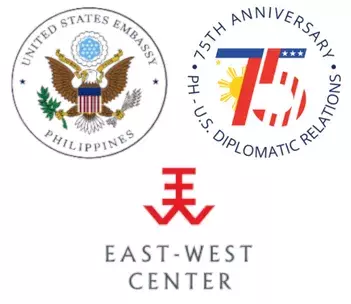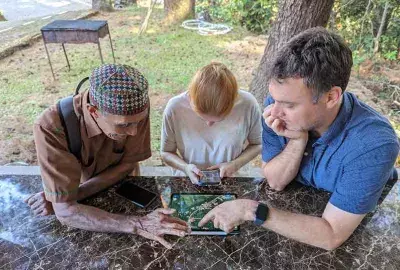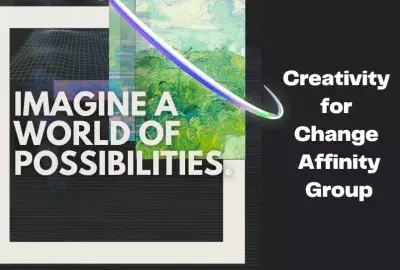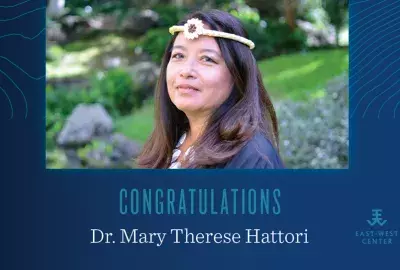Error message

The East-West Center in Washington and the U.S. Embassy in the Philippines are proud to convene this eminent group of scholars from Ateneo de Manila University to assess the depth and breadth of US-Philippine relations. This special APB series works in tandem with the Philippines Matters for America publication to elucidate the wide range of commercial, diplomatic, security, and people-to-people ties between the United States and the Philippines. Both publications support the U.S. Embassy in the Philippines’ campaign to celebrate the 75th Anniversary of the Establishment of Diplomatic Relations between the Republic of the Philippines and the United States of America.
75 Years Of Philippines-US Relations: From Strategic Partnership to Multifaceted Relationship
Dr. Maria Elissa J. Lao & Severo Madrona Jr., PhD, faculty at Ateneo de Manila University, explain how US-Philippine Relations evolved "from a strategic military and economic partnership into a multifaceted relationship encompassing cultural, social, and governance cooperation."
Challenges and Gains in Military Relations Between the Philippines and the United States
Leslie V. Advincula-Lopez, PhD, Development Studies Program and Institute of Philippine Culture Ateneo de Manila University, explains how, "changes in the global socio-political environment forced the Philippines and the United States to continuously re-calibrate the forms and mechanisms of their defense cooperation."
US-Philippine Defense Cooperation for Maritime Security
Jennifer Oreta, PhD, Coordinator of Ateneo Initiative for Southeast Asian Studies, and Assistant Professor of the Department of Political Science, Ateneo de Manila University Philippines, explains that "[t]he chief maritime security concerns in contemporary Southeast Asia are piracy, terrorism at sea, and China’s seizure of contested islands in the South China Sea."
Philippine-United States Trade Relations: Looking Back and a Way Forward
Marissa Maricosa A. Paderon, PhD, Associate Professor of the Department of Economics at the Ateneo de Manila University and current Commissioner at the Philippine Tariff Commission, explains how the two nations have forged relationships across many sectors of trade, especially electronics and agriculture, and discusses the importance of the Trade and Investment Framework Agreement (TIFA) and US Generalized System of Preferences (GSP) in Philippine-US economic relations.
A Proverbial Shot in the Arm: US Investment Is Key to Boost Philippine Economic Recovery and Resilience
Ser Percival K. Peña-Reyes, PhD, Director of the Ateneo Center for Economic Research and Development explains that "despite all the challenges faced by the Philippines, the United States continues to be a huge source of fresh equity capital (one of three components of FDI). Among 123 equity capital sources, the United States is the second largest..."
Running Out of Gas in the Philippines: A Boon or Bane?
Majah-Leah V. Ravago, PhD, Associate Professor at the Department of Economics, Ateneo de Manila University, former Program Director of a USAID energy policy grant, and East-West Center Graduate Fellowship alumnae, explains that "[t]he COVID-19 pandemic and the anticipated depletion of the Malampaya proffer opportunities to facilitate an efficient transition to cleaner energy."
The Philippines-US Development Partnership
Diana J. Mendoza, PhD, Assistant professor of political science at the Ateneo de Manila University and director of the Ateneo Initiative for Southeast Asian Studies, explains how in the post-World War II era, US official development assistance (ODA) to the Philippines has undergone multiple shifts in emphasis in accordance with priorities determined by the US Congress.
The Complex History Of US-Philippine Health Partnership
Leslie V. Advincula-Lopez, PhD, Development Studies Program and Institute of Philippine Culture Ateneo de Manila University, explains that "[l]ong before the term, global health diplomacy (GHD) became a buzzword in international relations, an efficient Philippine public health system... was a focal point of US-Philippine relations."
Consolidation, Contestation and Convergence: Revisiting American Influence on the Development of Philippine Social Sciences
Enrique Nino Leviste, PhD, Associate Professor, Department of Sociology and Anthropology, Ateneo de Manila University explains that "the emergence of specialized social science disciplines came about with the establishment of academic departments in the early American colonial period, circa 1900."
Examining Philippine-US Cooperation Amid the Covid-19 Pandemic: Setting a Broader Agenda for Educating Filipino Children and Youth
Ma. Glenda Lopez Wui, PhD, Assistant Professor, Department of Sociology and Anthropology, Ateneo de Manila University, explains that “[t]he US Government has been providing support to the Philippines to mitigate the impact of the pandemic on Filipino students,” including providing nearly $3 million in funds and equipment to support education delivery.
The East-West Center in Washington and the U.S. Embassy in the Philippines are proud to convene this eminent group of scholars from Ateneo de Manila University to assess the depth and breadth of US-Philippine relations. This special APB series works in tandem with the Philippines Matters for America publication to elucidate the wide range of commercial, diplomatic, security, and people-to-people ties between the United States and the Philippines. Both publications support the U.S. Embassy in the Philippines’ campaign to celebrate the 75th Anniversary of the Establishment of Diplomatic Relations between the Republic of the Philippines and the United States of America.
75 Years Of Philippines-US Relations: From Strategic Partnership to Multifaceted Relationship
Dr. Maria Elissa J. Lao & Severo Madrona Jr., PhD, faculty at Ateneo de Manila University, explain how US-Philippine Relations evolved "from a strategic military and economic partnership into a multifaceted relationship encompassing cultural, social, and governance cooperation."
Challenges and Gains in Military Relations Between the Philippines and the United States
Leslie V. Advincula-Lopez, PhD, Development Studies Program and Institute of Philippine Culture Ateneo de Manila University, explains how, "changes in the global socio-political environment forced the Philippines and the United States to continuously re-calibrate the forms and mechanisms of their defense cooperation."
US-Philippine Defense Cooperation for Maritime Security
Jennifer Oreta, PhD, Coordinator of Ateneo Initiative for Southeast Asian Studies, and Assistant Professor of the Department of Political Science, Ateneo de Manila University Philippines, explains that "[t]he chief maritime security concerns in contemporary Southeast Asia are piracy, terrorism at sea, and China’s seizure of contested islands in the South China Sea."
Philippine-United States Trade Relations: Looking Back and a Way Forward
Marissa Maricosa A. Paderon, PhD, Associate Professor of the Department of Economics at the Ateneo de Manila University and current Commissioner at the Philippine Tariff Commission, explains how the two nations have forged relationships across many sectors of trade, especially electronics and agriculture, and discusses the importance of the Trade and Investment Framework Agreement (TIFA) and US Generalized System of Preferences (GSP) in Philippine-US economic relations.
A Proverbial Shot in the Arm: US Investment Is Key to Boost Philippine Economic Recovery and Resilience
Ser Percival K. Peña-Reyes, PhD, Director of the Ateneo Center for Economic Research and Development explains that "despite all the challenges faced by the Philippines, the United States continues to be a huge source of fresh equity capital (one of three components of FDI). Among 123 equity capital sources, the United States is the second largest..."
Running Out of Gas in the Philippines: A Boon or Bane?
Majah-Leah V. Ravago, PhD, Associate Professor at the Department of Economics, Ateneo de Manila University, former Program Director of a USAID energy policy grant, and East-West Center Graduate Fellowship alumnae, explains that "[t]he COVID-19 pandemic and the anticipated depletion of the Malampaya proffer opportunities to facilitate an efficient transition to cleaner energy."
The Philippines-US Development Partnership
Diana J. Mendoza, PhD, Assistant professor of political science at the Ateneo de Manila University and director of the Ateneo Initiative for Southeast Asian Studies, explains how in the post-World War II era, US official development assistance (ODA) to the Philippines has undergone multiple shifts in emphasis in accordance with priorities determined by the US Congress.
The Complex History Of US-Philippine Health Partnership
Leslie V. Advincula-Lopez, PhD, Development Studies Program and Institute of Philippine Culture Ateneo de Manila University, explains that "[l]ong before the term, global health diplomacy (GHD) became a buzzword in international relations, an efficient Philippine public health system... was a focal point of US-Philippine relations."
Consolidation, Contestation and Convergence: Revisiting American Influence on the Development of Philippine Social Sciences
Enrique Nino Leviste, PhD, Associate Professor, Department of Sociology and Anthropology, Ateneo de Manila University explains that "the emergence of specialized social science disciplines came about with the establishment of academic departments in the early American colonial period, circa 1900."
Examining Philippine-US Cooperation Amid the Covid-19 Pandemic: Setting a Broader Agenda for Educating Filipino Children and Youth
Ma. Glenda Lopez Wui, PhD, Assistant Professor, Department of Sociology and Anthropology, Ateneo de Manila University, explains that “[t]he US Government has been providing support to the Philippines to mitigate the impact of the pandemic on Filipino students,” including providing nearly $3 million in funds and equipment to support education delivery.







